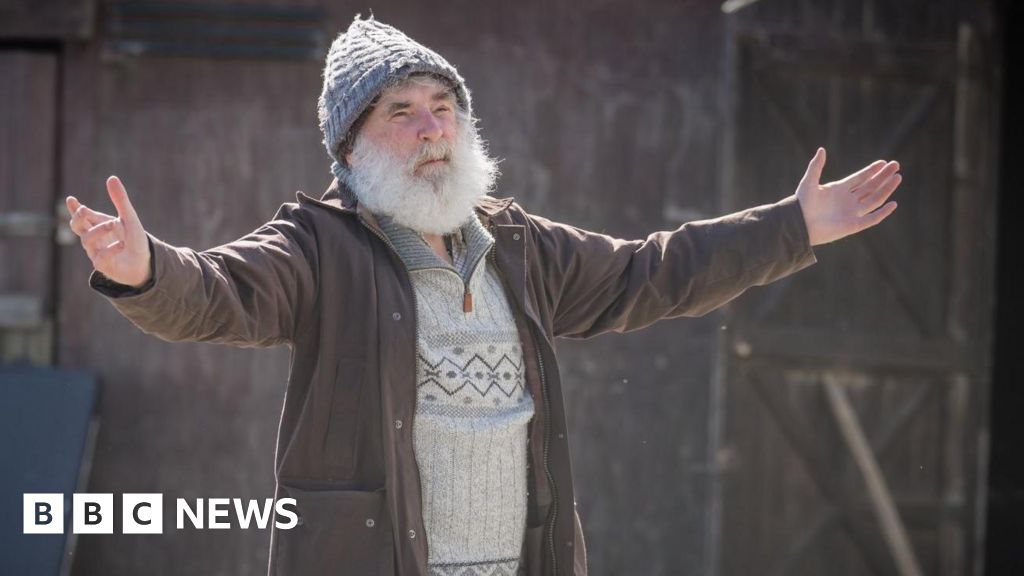Paul GlynnCulture reporter

- Spoiler warning: This article reveals details from The Celebrity Traitors
The Traitors, at its heart, is a game of lying and deception.
The celebrity edition of the hit show began this week, and with it a murdering spree. For the first, it was Alan Carr in the kitchen with the poisoned lily.
Just as in the regular series, we find a bunch of people attempting to find out who is lying and who is telling the truth, while faced with the enormous uncertainty of being “killed” off.
On this occasion, the victim was singer Paloma Faith. She was unimpressed to be bumped off by Carr, who is her friend – or so she thought.
So why have so many viewers taken the show to their hearts, and what does it say about our human nature?
For Richard Wiseman, professor of the public understanding of psychology at the University of Hertfordshire, such treachery “feels a bit like everyday life”.
“You’re trying to figure out which of your friends and partners and colleagues may not be entirely straight with you,” he tells News.
Deception, he says, “is in our DNA” as something we do from around the age of three. “As soon as children master language, they start lying,” adds Prof Wiseman.
“If we were radically honest with one another all the time, then we’d probably break apart as a society fairly rapidly. So on one level, deception holds us together.”
The problem, he adds, is that it can also be used in an “exploitative way”, as anyone who tuned in this week to find current Celebrity Traitors Alan Carr, Cat Burns and Jonathan Ross scheming so splendlidly will testify.
“It absolutely fascinates us… you’ve got that microcosm, you can see all of that being played out in a rather fun way.”

The hardest thing with lie detecting is knowing how people behave normally, according to Prof Wiseman, who has written about the psychology of magic and illusion, deception, luck and self-development.
“What we’re quite good at is, when it’s friends and partners, we know their truthful behaviour,” he says. “And you’re looking for people departing from that.”
For example, when TV presenter Kate Garraway stood accused of being a potential traitor for her excessively theatrical reactions, she defended herself by explaining she was always “a ham”.
“Now, you have to know her to know how she behaves normally to know whether this is deceptive or not.”
Prof Wiseman thinks the faithful stars are going wrong by so far basing their assumptions on what people do and say, when “the best signals are what people don’t say and don’t do”.
“Liars tend to be pretty quiet,” he says, noting the difficulties of that with “a bunch of celebrities” who will be “used to being centre of attention”.
Singer Burns, one of the traitors, told viewers she planned to “lay low” and go “under the radar”, and it seems to be working so far.
Good liars also tend to be intelligent, Wiseman says, citing salespeople, politicians and – ahem – performers among those who will be “pretty high self-monitors”.
“Alan Carr and Jonathan Ross are very used to interviewing people,” he says. “And used to interviewees who will be somewhat elusive.”

So do actors and performers like those on this show make better liars than previous contestants?
Not according to one of the current faithful, actor and presenter Stephen Fry, who told the Radio Times: “Actors are terrible liars! It’s not an actor’s job to lie. It’s an actor’s job to tell the truth.”
But was he telling the truth or lying?
Jake Brown, joint winner from series three, told Breakfast he thinks professional performers “know how to deceive, they know how to be someone else”.
Series three finalist Alexander Dragonetti tells News that anyone hoping to rely on their acting skills to win will have to be “incredibly consistent” and do it “perfectly day after day”.
“If anyone sees even a small chink in your armour, they’ll think you’re playing a game and they’ll get rid of you,” he says.
“So if you do act, this is going to be the test of your life. You’re going to have to do it perfectly day after day.
“And the days are long, the pressure is huge, and holding up that kind of act for any period I think is going to be incredibly hard.”
‘The illusion of co-operation’
On the latest episode, beloved veteran actress Celia Imrie was seen telling her fellow participants: “People think I’m nice, but I’m not.”
For psychologist Susan Young, the celebrity edition of the show adds an extra level of deception and intrigue due to the professional “impression management” of pre-existing personas.
Viewers “project pre-existing beliefs” on to the stars because “these are people who we feel we know”, she tells us. But in reality we “can’t tell where the performance ends and where it begins”.
As “voyeurs of morality”, she adds, “we can’t wait for the nice person to do something unexpectedly”.
The group dynamic is what interests Young most because what lies beneath is an inherent “double bind”. “Everyone must lie”, she says, because “to be honest is dangerous”; and yet “lying corrodes the team”, which is much-needed to complete tasks.
“What the show does here, it exposes the illusion of co-operation and that’s in so many systems. It’s in our workplaces, it’s in politics, it’s in friendships under stress,” she says.
“At the end of the day, given certain circumstances and under certain pressures, altruism will thin and self-interest surfaces.”
She adds: “It’s almost like a social experiment, it’s mirroring how quickly loyalty will collapse when incentives change.”

Caroline Frost, TV editor of the Radio Times, reckons The Celebrity Traitors is on course to be “one of the biggest shows of the year”.
Two years ago, she recalls, she attended an industry seminar where producers said they had resisted the urge to include celebrities in the original show because they thought it was more interesting to select people who did not have public reputations to keep intact.
But that was then, and this is now.
The great paradox of a new celebrity version, she smiles, is that none of their careers and reputations “count for anything come nightfall”.
“The further they get into the game, the more of the celebrity trappings get left behind and the less important their fame becomes, which means it really doesn’t matter that they’re celebrities at all.”
Frost thinks it was an “incredibly ingenious decision” to make Carr a traitor “because he’s giggly and extrovert and doesn’t seem to be able to ever filter what he says or keep a secret”.
“Making him a traitor has really upped the stakes.”
She feels Carr’s repuatation as a bubbly, chatty man has been “weaponised” to enable him to get away with murdering his mate in plain sight.
He did seem a bit cut up about it afterwards, mind you, when he met up again with his fellow traitors.
But as Ross reminded him: “You’re not a bad person. You’re a good traitor.”
The Celebrity Traitors is on One on Wednesdays and Thursdays at 21:00 BST and on iPlayer.
Additional reporting by Chris Gibson.




